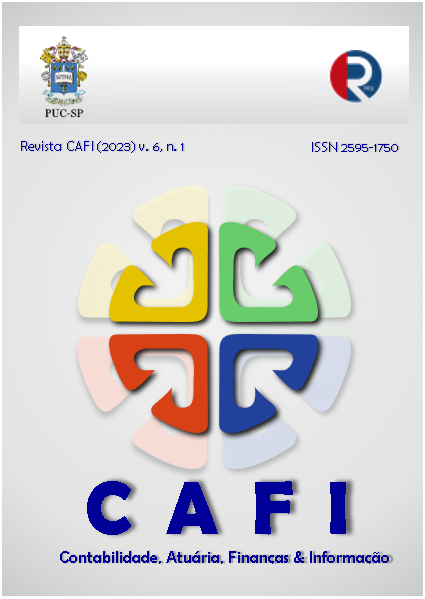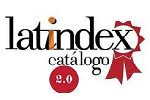Construction of knowledge in Accounting:
a debate on learning styles and active methodologies
DOI:
https://doi.org/10.23925/cafi.v6i1.60461Keywords:
Learning styles, Active methodologies, Teaching-learning, AccountingAbstract
Based on advances in the debate on the teaching-learning process and its new configurations, this bibliographic review sought to present the holistic view of active methodologies in the educational process. Individual characteristics that may suggest different learning preferences were included in this discussion, highlighting learning styles. To provide an overview of learning styles studies, some models were presented about these styles and how they can be expressed. Furthermore, a link was established between active methodologies and learning styles. Based on this constructed relationship, a brief review of studies on active methodologies and learning styles applied to Brazilian accounting education was carried out. The results showed that, despite the complexity in this scenario, attempts have been made to include active learning methodologies in the teaching of accounting in the Brazilian context. Studies have analyzed the effects of students' and teachers' learning styles, as well as the teaching methods used, and have highlighted the importance of considering learning styles in the planning of teaching strategies. The adoption of active learning methodologies has been shown to have an influence on students' performance, and strategies such as group work, guided reading, and expository lectures have been considered effective in learning. It’s expected that this review can help in understanding the concepts related to the topics discussed here and create reflections to encourage planning and possible adoption of active methodologies in higher education in accounting.
References
Alonso, C. M., Gallego, D. J., & Honey, P. (2002). Los estilos de aprendizaje: procedimientos de diagnóstico y mejora. 8.ed. Bilbao, España: Mensajero.
An, D., & Carr, M. (2017). Learning styles theory fails to explain learning and achievement: Recommendations for alternative approaches. Personality and Individual Differences, 116, 410-416. https://doi.org/10.1016/j.paid.2017.04.050
Araújo, R. A. G. S., Silva, L. K. C., Marques, V. A., & Costa, J. W. (2019). Relação entre estilos de aprendizagem e características dos estudantes de ciências contábeis: Uma investigação a partir do modelo de Felder & Silverman (1988). Revista Mineira de Contabilidade, 20(3), 59-72. https://doi.org/10.21714/2446-9114RMC2019v20net05
Barbosa, E. F. & Moura, D. G. (2014). Metodologias ativas de aprendizagem no ensino de engenharia. Anais International Conference on Engineering and Technology Education, Cairo, Egito, 13.
Baumann, J. F. (1988). Direct instruction reconsidered. Journal of Reading, 31(8), 712-718. https://www.jstor.org/stable/40032953
Berbel, N. A. N. (2011). As metodologias ativas e a promoção da autonomia de estudantes. Semina: Ciências Sociais e Humanas, 32(1), pp. 25-40.
Borges, L. F. M., Leal, E. A., Silva, T. D., & Pereira, J. M. (2018). Rendimento acadêmico e estilos de aprendizagem: um estudo na disciplina análise de custos. Revista Alcance (Online), 25(2), 161-176. http://www.spell.org.br/documentos/ver/51893/rendimento-academico-e-estilos-de-aprendizagem--um-estudo-na-disciplina-analise-de-custos-/i/pt-br
Cassidy, S. (2004). Learning styles: An overview of theories, models, and measures. Educational psychology, 24(4), 419-444. https://doi.org/10.1080/0144341042000228834
Cerqueira, T. C. S. (2000). Estilos de aprendizagem em universitários. Tese (Doutorado em Educação) – Faculdade de Educação, Universidade Estadual de Campinas. Campinas, 2000. https://hdl.handle.net/20.500.12733/1588328
Coffield, F., Moseley, D., Hall, E., & Ecclestone, K. (2004). Should we be using learning styles? What research has to say to practice. Learning and Skills Research Centre, London. http://hdl.voced.edu.au/10707/64981
Coimbra, C. A aula expositiva dialogada em uma perspectiva freireana. (2017) In: Leal, E. A., Miranda, G. J., & Casa Nova, S. P. D. C. (2017). Revolucionando a sala de aula: como envolver o estudante aplicando técnicas de metodologias ativas de aprendizagem. Atlas.
Costa, R. D., Souza, G. F., Valentim, R. A., & Castro, T. B. (2020). The theory of learning styles applied to distance learning. Cognitive Systems Research, 64, 134-145. https://doi.org/10.1016/j.cogsys.2020.08.004
Dantas, L. A., & Cunha, A. (2020). An integrative debate on learning styles and the learning process. Social Sciences & Humanities Open, 2(1), 100017. https://doi.org/10.1016/j.ssaho.2020.100017
Duff, A. (2004). The role of cognitive learning styles in accounting education: developing learning competencies. Journal of Accounting Education, 22(1), 29-52. https://doi.org/10.1016/j.jaccedu.2003.09.004
Felder, R. M.; Brent, R. (2005). Understanding student differences. Journal of Engineering Education, 94(1), 57-72. https://doi.org/10.1002/j.2168-9830.2005.tb00829.x
Guerra, C. J. O., & Teixeira, A. J. C. (2016). Os impactos da adoção de metodologias ativas no desempenho dos discentes do curso de ciências contábeis de instituição de ensino superior mineira. Revista de Educação e Pesquisa em Contabilidade, 10(4), 380-397. http://dx.doi.org/10.17524/repec.v10i4.1437
Gungor, F., Kurtb, H., & Ekicic, G. (2014). The relationship between personality types and self-efficacy perceptions of student teachers. Procedia-Social and Behavioral Sciences, 116, 786-790. https://doi.org/10.1016/j.sbspro.2014.01.298
Gwee, M. C.E. (2009). Problem-based learning: a strategic learning systhemdesign for the education of healthcare professionals in the 21ST Century. The Kaohsiung Journal of Medical Sciences, 25(5), 231-239. https://doi.org/10.1016/S1607-551X(09)70067-1
Keirsey, D., & M. Bates. (1984). Please understand me: Character & temperament types. Del
Mar, CA: Prometheus Nemesis Book Company.
Kolb, A. Y. (2013). The Kolb Learning Style Inventory 4.0: A comprehensive guide to the theory, psychometrics, research on validity and educational applications. Philadelphia, PA: Hay Group.
Kolb, D. A. (1984). Experiential learning: experience as the source of learning and development. Englewood Cliffs: Prentice-Hall.
Leal, E. A., & Borges, M. D. P. P. (2016). Estratégias de ensino aplicadas na área da contabilidade gerencial: um estudo com discentes do curso de ciências contábeis. Revista Ambiente Contábil, 8(2), 1-18.
Leal, E. A., Miranda, G. J., & Casa Nova, S. P. D. C. (2017). Revolucionando a sala de aula: como envolver o estudante aplicando técnicas de metodologias ativas de aprendizagem. Atlas.
Lima, F. D. P. M., Martins, R. X., & Ferreira, H. M. (2020). Reflexões sobre os processos didático-pedagógicos na educação superior: para além da moda das metodologias ativas. Devir Educação, 4(2), 149-169. https://doi.org/10.30905/ded.v4i2.307
Madureira, N. L., Succar Junior, F., & Gomes, J. S. (2011). Estudo sobre os métodos de ensino utilizados nos cursos de ciências contábeis e administração da universidade estadual do rio de janeiro (UERJ): a percepção de docentes e discentes. Revista de Informação Contábil, 5(2), 43-63. https://doi.org/10.34629/ric.v5i2.43-63
Messick, S. (1984). The nature of cognitive styles: Problems and promise in educational practice. Educational psychologist, 19(2), 59-74. https://doi.org/10.1080/00461528409529283
Moran, J. (2015). Mudando a educação com metodologias ativas. Coleção mídias contemporâneas. Convergências midiáticas, educação e cidadania: aproximações jovens, 2(1), 15-33.
Moran, J. (2018). Metodologias Ativas para Aprendizagem mais Profunda. In: Bacich, L., & Moran, J. (2018). Metodologias ativas para uma educação inovadora: uma abordagem teórico-prática. Penso Editora.
Moser, S., & Zumbach, J. (2018). Exploring the development and impact of learning styles: An empirical investigation based on explicit and implicit measures. Computers & Education, 125, 146-157. https://doi.org/10.1016/j.compedu.2018.05.003
Moya, E. C. (2017). Using Active Methodologies: The StudentśView. Procedia-Social and Behavioral Sciences, 237, 672-677. https://doi.org/10.1016/j.sbspro.2017.02.040
Nagib, L. D. R. C., & Silva, D. M. D. (2020). Adoção de metodologias ativas e sua relação com o ciclo de vida e a qualificação docente no ensino de graduação em ciências contábeis. Revista Contabilidade & Finanças, 31(82), 145-164. https://doi.org/10.1590/1808-057x201909030
Nascimento, J. L., & Feitosa, R. A. (2020). Metodologias ativas, com foco nos processos de ensino e aprendizagem. Research, Society and Development, 9(9), e622997551-e622997551. https://doi.org/10.33448/rsd-v9i9.7551
Neuhauser, C. (2002). Learning style and effectiveness of online and face-to-face instruction. The American Journal of Distance Education, 16(2), 99-113. https://doi.org/10.1207/S15389286AJDE1602_4
Nganga, C. S. N., Botinha, R. A., Miranda, G. J., & Leal, E. A. (2016). Mestres e doutores em contabilidade no Brasil: uma análise dos componentes pedagógicos de sua formação inicial. REICE: Revista Electrónica Iberoamericana sobre Calidad, Eficacia y Cambio en Educación, 14(1), 83-99. https://doi.org/10.15366/reice2016.14.1.005
Nogueira, D.R., Leal, E. A., Miranda, G. J., & Casa Nova, S. P. D. C. (2020). Revolucionando a sala de aula 2: Novas Metodologias ainda mais ativas. Atlas.
Nolli, J. G., Giordani, M. S., Domingues, M. J. C. S., & Zonatto, V. C. S. (2019). Avaliação da aprendizagem em ciências contábeis: um estudo bibliométrico e sociométrico. Revista Contabilidade e Controladoria, 11(2), 40-56. http://dx.doi.org/10.5380/rcc.v11i2.65010
Oliveira, A. J., Raffaelli, S. C. D., Colauto, R. D., & Casa Nova, S. P. C. (2013). Estilos de aprendizagem e estratégias ludopedagógicas: percepções no ensino da contabilidade. Advances in Scientific and Applied Accounting, 6(2), 236-262. https://10.14392/ASAA.2013060206
Ormazábal, I., Borotto, F. A., & Astudillo, H. F. (2021). An agent-based model for teaching–learning processes. Physica A: Statistical Mechanics and its Applications, 565, 125563. https://doi.org/10.1016/j.physa.2020.125563
Penzias, A. (2020). Team Learning and Development Using the Myers-Briggs Type Indicator® and the Clifton StrengthsFinder®. Journal of Radiology Nursin, 39(2), 80-81. http://dx.doi.org/10.1016/j.jradnu.2019.12.013
Pozo, J. I. (2016). Aprendizes e mestres: a nova cultura da aprendizagem. Artmed Editora.
Pupo, E. A., & Torres, E. O. (2009). Las investigaciones sobre los estilos de aprendizaje y sus modelos explicativos. Revista de estilos de aprendizaje, 2(4). https://doi.org/10.55777/rea.v2i4.887
Scherer, R., Howard, S. K., Tondeur, J., & Siddiq, F. (2020). Profiling Teachers’ Readiness for Online Teaching and Learning in Higher Education: Who’s Ready?. Computers in Human Behavior, 118, 106675. https://doi.org/10.1016/j.chb.2020.106675
Schmeck, R. R., Ribich, F., & Ramanaiah, N. (1977). Development of a self-report inventory for assessing individual differences in learning processes. Applied psychological measurement, 1(3), 413-431. https://doi.org/10.1177/014662167700100310
Silva, D. M. & Oliveria Neto, J. D. (2010). O Impacto dos Estilos de Aprendizagem no Ensino de Contabilidade. Contabilidade Vista & Revista, 21(4), 123-156. https://revistas.face.ufmg.br/index.php/contabilidadevistaerevista/article/view/810
Silva, J. F. (2018). Didática no Ensino Superior: estratégias de ensino adequadas à arte de ensinar. Educação Por Escrito, 9(2), 204-219. https://doi.org/10.15448/2179-8435.2018.2.31275
Smallwood, J., Fishman, D. J., & Schooler, J. W. (2007). Counting the cost of an absent mind: Mind wandering as an underrecognized influence on educational performance. Psychonomic bulletin & review, 14(2), 230-236. https://doi.org/10.3758/BF03194057
Smith, E. S. (2001). The relationship between learning style and cognitive style. Personality and Individual Differences, 30(4), 609-616. https://doi.org/10.1016/S0191-8869(00)00059-3
Souza, L. M., Avelino, B. C., & Takamatsu, R. T. (2017). Estilos de aprendizagem e influência no processo de ensino-aprendizagem: Análise empírica na visão de estudantes de contabilidade. Revista Ambiente Contábil, 9(2), 379-400. https://doi.org/10.21680/2176-9036.2017v9n2ID10850
Stanley, T. A. & Marsden, S. J. (2012). Problem-based learning: does accounting education need it? Journal of Accounting Education, 30(3-4), pp. 267–289. https://doi.org/10.1016/j.jaccedu.2012.08.005
Downloads
Published
How to Cite
Issue
Section
License
Copyright (c) 2023 CAFI

This work is licensed under a Creative Commons Attribution 4.0 International License.
Declaração de Direito Autoral
Autores mantém os direitos autorais e concedem à revista o direito de primeira publicação, com o trabalho simultaneamente licenciado sob a Licença Creative Commons Attribution que permite o compartilhamento do trabalho com reconhecimento da autoria e publicação inicial nesta revista.
Declaração de Privacidade
Os nomes e endereços informados nesta revista serão usados exclusivamente para os serviços prestados por esta publicação, não sendo disponibilizados para outras finalidades ou a terceiros.









